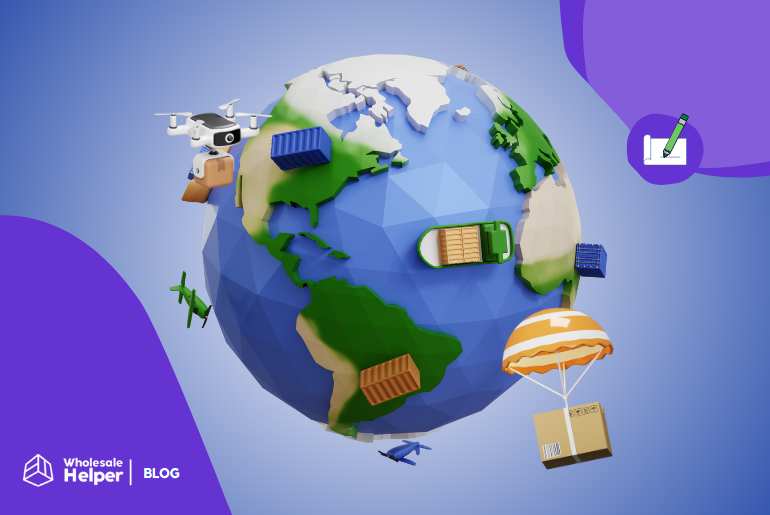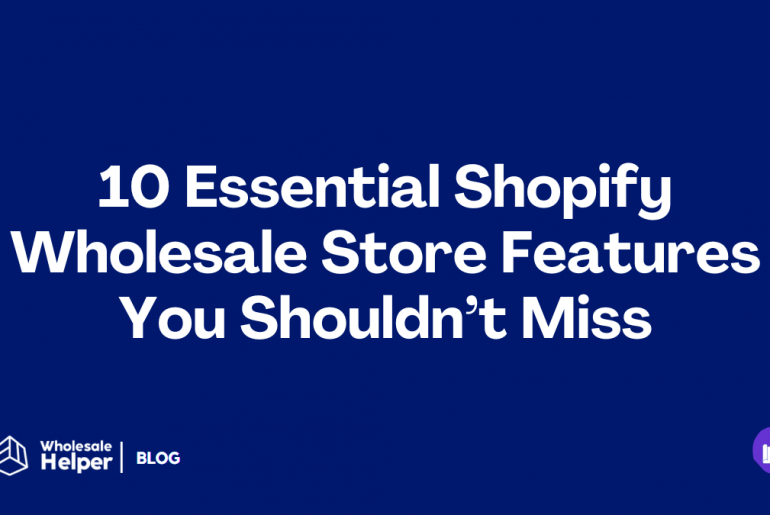In the intricate wholesale trade dance, time is not merely a resource; it’s the standard by which business success is measured.
For every player in the supply chain – from manufacturers and distributors to retailers – timely deliveries are the linchpin that holds together operational efficiency and customer satisfaction.
The Ripple Effect of Delay
Even the slightest deviation from scheduled delivery times can create a chain reaction of issues that ripple through the entire B2B ecosystem. Shelves sitting empty as the result of late stock can, in turn, reverberate in terms of lost sales, stock obsolescence, and, more broadly, damage to customer relationships.
Supply chain managers understand the domino effect well. When a shipment is delayed, retailers might miss out on crucial inventory, resulting in lost sales and unhappy customers.
Also, holding too much stock because of delays in later deliveries can result in higher storage costs and slower sales of inventory items. In this cycle, time becomes an invisible budget item, with each hour translating into a financial impact that markets cannot afford to ignore.
Also Read:
- 30 Best Wholesale Products to Sell Online: The Ultimate List
- 6 Easy Steps on How To Buy Wholesale Products to Resell on Shopify [2024]
The Anatomy of Punctuality In Wholesale Trade
The on-time delivery metric is a tightrope B2B businesses must walk. Too early, and the receiving business may struggle to accommodate the unexpected stock, leading to inefficiencies on their side. Too late, and the implications are clear.
However, punctuality isn’t just about arrival times. It’s about predictability and the ability to forecast with precision. Wholesale buyers and supply chain managers need to rely on their partners to arrive within a window and do so consistently.
After all, a partner who can reliably adhere to their commitments saves the cost of not just the goods but the built-in operational excesses that cover for unreliable deliveries. An (all-inclusive) shipping container transport company that can meet delivery schedules reliably becomes an invaluable partner, regardless of whether the items are toys, electronics, or raw materials for manufacturing.
Managing Time
The answer doesn’t merely lie in faster deliveries but in smarter logistics. Using advanced tracking technologies, partnerships with reliable carriers, and maintaining strong lines of communication throughout the delivery timeline can turn the intangible entity of time into a strategic asset.
- Optimizing Routes: Every minute matters in an industry where time is money. This makes route optimization – choosing the most efficient path to complete a delivery task – a critical piece of the punctuality puzzle. Investing in software solutions that constantly analyze and adapt to traffic patterns and environmental conditions means businesses can reduce travel time and increase capacity.
- Technology-Driven Visibility: Cutting-edge technology in logistics is no longer optional. Real-time tracking via GPS, RFID, and IoT sensors gives businesses an unparalleled view of their deliveries. This not only means anticipating potential delays but also allowing for proactive scheduling and rerouting to maintain the integrity of delivery timelines.
- Responsive Partnerships: Partnering with logistics services with a consistent track record of on-time deliveries can be a game-changer. Responsive partnerships extend beyond the delivery itself, involving clear agreements and channels for resolving issues that could disrupt the supply chain.
The Cost of Losing Time
For wholesale buyers, time is a commodity as precious as the goods they handle. When supply management falters due to delays, the cost is two-fold. It’s the direct cost of the unsold inventory and the indirect cost of customer dissatisfaction, which can have long-term ramifications that far exceed the immediate margins of lost sales.
- Lost Sales and Opportunity Costs: In a fast-paced retail environment, the opportunity to capitalize on trends or seasonal demands is fleeting. Delays in delivering hot-selling products risk those sales being captured by competitors or missed altogether if the demand cools.
- Customer Satisfaction at Stake: In wholesale, the customer is frequently the retailer. Late deliveries shake this foundation, eroding the trust that underpins long-term partnerships. Customers who cannot rely on consistent stock flow from wholesale sources will look for other suppliers, a switch that can be both swift and permanent.
Collaborative Solutions for Timely Success
In the quest for better time management, collaboration is key. Manufacturers, distributors, and retailers must work in tandem, openly sharing data and insights to fine-tune their logistical symphony.
This synergy is not about individual businesses bending to the will of others but rather a harmonious cooperation where the collective aim is achieving peak punctuality.
- Integrated Systems: Seamless integration of systems across the supply chain – from inventory management to delivery tracking – ensures that information is shared and acted upon instantaneously, optimizing the cadence of supply.
- Data-Driven Insights: With the wealth of data available at every touchpoint of the supply chain, collaboration becomes a strategic weapon. By analyzing trends and performance metrics, partners can iron out inefficiencies and anticipate demand, ensuring that the right products arrive at the right time.
- Continuous Improvement: There’s no endpoint to the pursuit of perfect punctuality. Supply chain managers must be committed to a culture of continuous improvement, where even small gains in efficiency and reliability are celebrated and built upon.
Punctuality Pays Dividends
In the wholesale trade game, winning isn’t just about having the right products at the right price. It’s about having them available when the customer needs them, and this is a game where punctuality rules.
For each business day that time is respected and succumbed to, the bottom line reflects a success story in the making.
- Efficiency Equals Profitability: The more efficiently deliveries are managed, the higher the profitability. Reduced warehousing costs, increased inventory turnover, and minimized lost sales are the dividends of a time-sensitive supply chain.
- Customer Service as a Competitive Edge: A reputation for timeliness can become the most valuable asset a wholesale business owns. In a sector where many struggle to keep up, consistent and predictable deliveries can be the differentiator that sets a company apart.
- The Multiplying Effect of Logistics: Logistics is the multiplier in the supply and demand equation. Shrewd management of these operational intricacies means that each product does the work of two, three, or more.
Evaluating and Utilizing Transportation Services
Not all deliveries are created equal, and neither are the services that carry them. Understanding the different transportation services available is crucial to find the right fit for each situation. Ground, air, sea – each has its strengths and weaknesses.
- Understanding Transit Times
Transit times vary depending on the method of transportation. Understanding these variances is key to choosing the service that best aligns with your customer’s needs. - Cost-Benefit Analysis
Of course, there are costs associated with each service. Balancing speed against cost is an art, one that requires a clear understanding of your margins and market demands. - Leveraging Service Level Agreements
Service level agreements (SLAs) can be incredibly helpful in holding your transport providers accountable. They set the standard and can be crucial in negotiations and legal recourse if standards are unmet.
Summing up
Time is indeed money in wholesale trade. The efficient and effective use of time in the supply chain increases customer satisfaction, profitability, and gives a competitive edge among others.
By investing in the systems, partnerships, and collaborative approaches that expand the currency of time, businesses can ensure that their operations are profitable, adaptable, and sustainable in the constantly evolving world of B2B trade.
Offer Wholesale Pricing & Volume Discounts on Your Shopify Store
Try the Wholesale Pricing Discount app for Free!





![Top 11 Wholesale Suppliers In the USA [In 2026] – Updated Top 11 Wholesale Suppliers In the USA [in 2024]](https://wholesalehelper.io/blog/wp-content/uploads/2024/09/Top-11-Wholesale-Suppliers-In-the-USA-in-2024-1.png)



